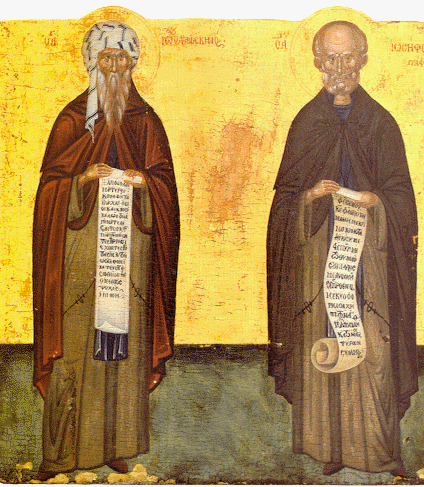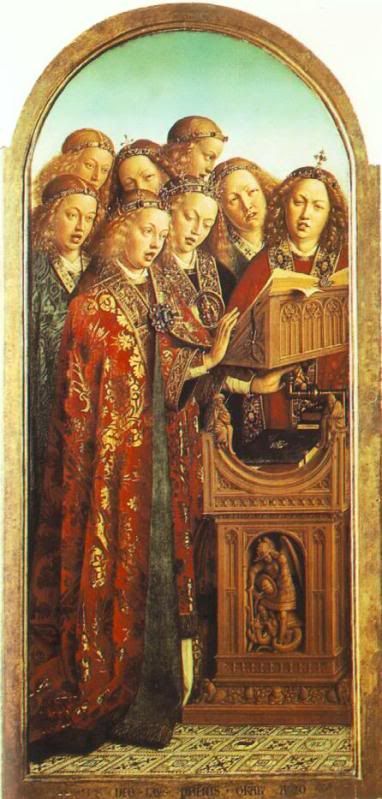Joseph was born into a pious Christian family in Sicily. His parents, Plotinus and Agatha, in response to an invasion of Arabs, moved the family to Greece. There, at the young age of 15, Joseph entered the monastery at Thessolonica, and earned the love and respect of his community through industriousness, obedience, piety, humility, and scholastic aptitude.
During a routine visit to the monastery, Saint Gregory (then deacon) took notice of the young brother, and asked him to accompany him to the church in Constantinople—then suffering under the iconoclast persecution (see also Saint Theodosia of Constantinople). There, they lived near the Church of the Holy Martyrs, defending religious icons, preaching the Word of God, and ministering to the suffering Christian population. When it was decided that an emissary should be sent to Rome to have audience with Pope Leo III and inform him of the persecution under the Byzantine Emperor, Joseph was selected due to his obedience, wisdom, and gift of oration. He set off for Rome at once.
But life was not to be easy for Saint Joseph. On the way to Rome, he was taken captive by Arab bandits, brought to the island of Crete, and turned over to the Iconoclasts who locked him away in a dungeon. Never giving up hope and faith in the Lord, Joseph ministered to his fellow prisoners, keeping their spirits high, praying with them, and inspiring many to die martyr’s deaths for the faith.
Saint Joseph spent six years in prison, until the death of the Byzantine Emperor and the end of the iconoclast persecution. Prior to his release, he received a heavenly vision from Saint Nicholas of Myra, who provided him with a scroll upon which read: “Hasten, O Bountiful One and as Thou art merciful, hasten to come to our aid, for as Thou wilst, Thou canst…” Saint Joseph, after receiving instruction from Saint Nicholas, sang the words aloud, causing his chains to fall to the ground and the prison gates to be opened. He returned to Constantinople where he established a church in patronage to Saint Nicholas, and later a monastery.
Saint Joseph received the gift of the relics of Saint Bartholomew, which he placed in the church. He felt compelled to sing a hymn of praise to the saint, but no such suitable hymn existed, and he didn’t feel qualified or capable to write a canon for one so deserving. Saint Joseph prayed for 40 days, trying to discern the proper course of action, upon when Saint Bartholomew appeared to him. He said, “May the Right Hand of Almighty God bless thee, may Heavenly Wisdom pour out upon thy tongue, may thy heart be a temple of the Holy Spirit, and may thy hymnody sweeten the universe.” Following the apparition, Joseph wrote the canon to Saint Bartholomew, and from then on began to compose liturgical hymns in honor of Jesus, the Heavenly Father, the Mother of God, and the Saints.
One of those hymns, Stars of the Morning, follows:
Stars of the morning, so gloriously bright,
Filled with celestial splendor and light,
These that, where night never followeth day,
Raise the “Thrice Holy” song ever and aye.
These are Thy ministers, these dost Thou own,
God of Sabaoth, the nearest Thy throne;
These are Thy messengers, These dost Thou send,
Help of the helpless ones! man to defend.
“Who like the Lord?” thunders Michael the chief;
Raphael, “the cure of God,” comforteth grief;
And, as at Nazareth, prophet of peace,
Gabriel, “the light of God,” bringeth release.
Then, when the earth was first poised in mid space,
Then, when the planets first sped on their race,
Then, when were ended the six days’ employ,
Then all the sons of God shouted for joy.
Still let them succor us; still let them fight,
Lord of angelic hosts, battling for right;
Till, where their anthems they ceaselessly pour,
We with the angels may bow and adore.
Upon the resurgence of iconoclasm, Saint Joseph was exiled for eleven years, but was subsequently returned to his position in Constantinople, and eventually made Bishop of Salonica. He continued to write Canons and hymns, many of which survive. After attaining advanced age for that time, Saint Joseph fell ill. Prior to his death, he received a vision from the Lord, telling of his approaching journey to Heaven. Saint Joseph set his affairs in order, and spent the remainder of his days in quiet prayer. He received Holy Eucharist, blessed those from the community who were present, and joyfully gave his life to the Lord. Saint Theodore, later appearing to an impatient friend of Saint Joseph stated, "Why do you become angry O man? Joseph the Hymnographer's soul was being separated from his body and we were with him. When he died this night, all of us whom he glorified in hymns, translated his soul to the heavens and placed it before the Face of God. That is why I was tardy in not appearing to you."
Saint Joseph is credited with 200 hymns and canons, although some place the number he wrote at more than one thousand. Throughout his life, he preached the Word of God—through his writings, through Canons to the Saint, through opposition to persecution, and through joyful song. Encouraged by his visions of saints, Saint Joseph the Hymnographer raised his voice in praise of Our Lord, even when he faced violent opposition, imprisonment, and exile. How often can we say the same of ourselves?
Let Us Now Our Voices Raise (written by Saint Joseph, the Hymnographer)
Let us now our voices raise,
God Himself to joy and praise
Turns our human sadness;Joy that martyrs won their crown,
Opened heav’ns bright portal,
When they laid the mortal down
For the life immortal.
Never flinched they from the flame,
From the torment never;
Vain the tyrant’s sharpest aim,
Vain each fierce endeavor:
For by faith they saw the land
Decked in all its glory,
Where triumphant now they stand
With the victor’s story.
Up and follow, Christian men!
Press through toil and sorrow;
Spurn the night of fear, and then,
O the glorious morrow!
Who will venture on the strife;
Who will first begin it?
Who will grasp the land of life?
Warriors, up and win it!
Year 2: Day 165 of 365
Prayer Intentions: Praise for the Lord, ever on our lips!
Requested Intentions: Restoration of health (D); Successful employment for couple (N); For employment for children (K); For health of friend, for successful relationships for children, for safe pregnancy for daughter (C); For the health of a mother (J); Virtue for daughter (V); Successful acceptance to college for nephew (M); For the health of a cousin (T); Freedom from legal difficulties for husband (S); Husband’s freedom from illness (L); Personal intentions (S); Successful passing of dental board examination (P); Blessings on a family (Z); Successful permanent employment (C); Healing of a son with autism (J); Son’s successful employment (L); For the intentions of family and relatives, for the Carthusian community (T); For personal intentions (A); Restoration of lost hearing (C); Resolution of relational and financial challenges (S); Comfort following loss of husband, security for family, assistance with housing (B); Healing and return of brother (O); Successful hermitage foundation (S); Support from family, permission to marry (H); Recovery of wife following surgery, freedom from depression (W); Protection and recovery of mentally ill daughter (J); Successful resolution to legal proceedings (N); Freedom from worry and successful employment (M); For successful sale of home and freedom from debt (J); Freedom from pain and illness (E).













0 comments:
Post a Comment
Thanks for leaving a comment. If you wish to submit a prayer request, however, please do so above, using the "Contact" tab.